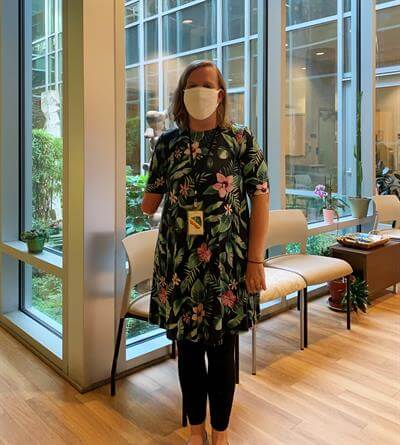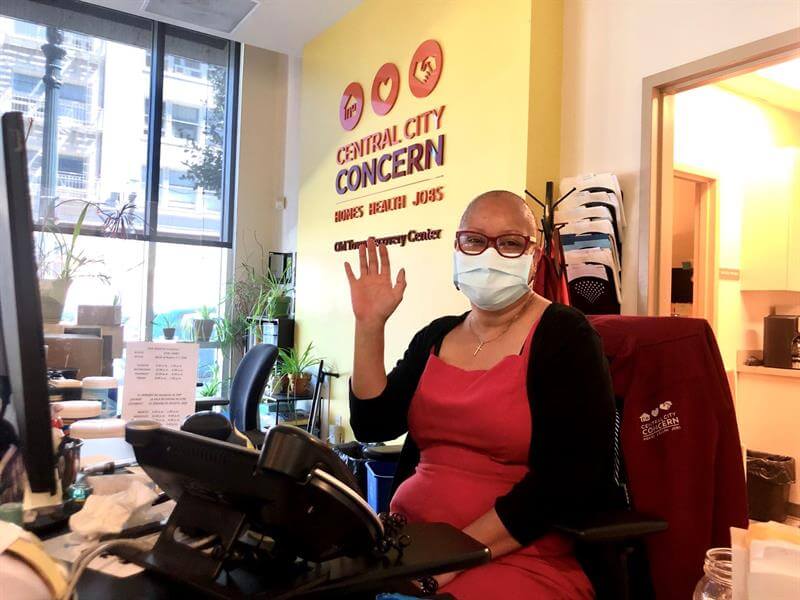This content block does not have a preview.
The uncertainty of COVID-19 is impacting many of us, but for people working through severe mental health challenges, the trauma and triggers associated with the pandemic can be especially overwhelming. During National Health Center Week, we want to recognize the important work of our staff at Old Town Recovery Center, who show up every day to provide compassionate, trauma-informed care for individuals experiencing major mental illness.
Central City Concern’s Old Town Recovery Center (OTRC) has been a mainstay provider for Portlanders experiencing severe mental illness for more than 20 years. The majority of clients experience both mental health and addiction challenges, some are homeless, and all have been impacted by many years of poverty.
For individuals with severe mental illness, it takes a dedicated, interdisciplinary team to work alongside clients and support their success. Through an integrated coordinated care model, patients receive physical and mental health care, medication from OTRC’s onsite pharmacy, and personalized case management tailored to their individual needs. While COVID-19 has brought trauma and triggers – from social isolation to uncertainty about the future – OTRC has maintained its team-based approach, keeping clients grounded in a community committed to helping them heal and meet their goals during these turbulent times.
In less than three days, clinicians made the switch to virtual visits by phone or video – something that hadn’t existed at Old Town Recovery Center before the pandemic.
Care teams and clinicians are a key ingredient to OTRC’s integrated model. Before the pandemic, nearly all clients enrolled in OTRC’s Intensive Case Management (ICM) program came in to the building for in-person visits with a counselor, psychiatrist or other mental health professional. In order to limit exposure to COVID-19 for clients and staff, the ICM team acted swiftly to ensure clients remained well-connected and supported.
More than 100 clients without access to technology received cell phones so they could stay in touch.
“The team is doing amazing things,” said Bob Kleinjan, OTRC Clinical Supervisor. “It’s been difficult, and everyone has adapted to really tough circumstances.
The fact that people are still showing up and doing their best is truly impressive.”
For clients experiencing the most severe mental health challenges, staff are still providing care onsite, in the field and by phone. The Community Outreach Recovery Engagement (CORE) team serves patients with major mental illness who would otherwise likely cycle in and out of hospitals, shelters or institutions. Caseloads are small on the CORE team and relationships are close.
 Sally Swain leads up OTRC's Community Outreach Recovery Engagement (CORE) team, where caseloads are small and relationships are close between clients and staff.
Sally Swain leads up OTRC's Community Outreach Recovery Engagement (CORE) team, where caseloads are small and relationships are close between clients and staff.
“We’re in their homes and we’re in the community,” said Sally Swain, program manager for OTRC’s CORE and Assertive Community Team. “We send our clients
birthday cards; we know their pets’ and neighbors’ names. We’re a supportive presence in their lives.”
Staff are calling clients daily to check in, delivering medicine and food boxes, and meeting their needs. It just looks a little different – wearing masks and staying six feet apart. But the connection is still there.
Pharmacists also play an important role in OTRC’s coordinated care model, serving as the connective tissue between clients’ primary care and psychiatric care. During COVID-19, the pharmacy remains a busy hub for clients picking up prescriptions and consulting with the pharmacists. For individuals cycling in and out of hospitals or homelessness, keeping track of medications can be a challenge. Pharmacists use tools like bubble-packing all of a client’s medications in one place, encouraging proper dosage and timing for medication adherence.
 OTRC's onsite pharmacy is bursting with action as staff work to fill medications.
OTRC's onsite pharmacy is bursting with action as staff work to fill medications.
One consistent anchor for clients before and during the pandemic has been the staff they see whenever they come in for an appointment or to pick up medication. Netta Holden supervises OTRC’s front desk and lobbies. She and her staff wear many hats – answering phone calls, connecting people to resources, de-escalating situations and triaging people in crisis. Now, Netta and her team also make sure clients are following physical distancing recommendations and properly wearing face coverings to reduce the spread of infection.
“I’ve grown up with a lot of our clients,” said Holden, who has been doing this work since the early 2000s. “Knowing where they came from, I love to see how far they’ve come.”
COVID-19 has been a true test for OTRC’s coordinated care model – which has proven effective for those we serve, despite the challenges.
“This experience has made it clear that our programs are adaptable,” said Swain. “Our staff are creative, and our clients are resilient. It’s been tough, but we’re getting through it together.”
 Netta Holden is an anchor for staff and clients alike. She and her staff set the mood for the first and second floor lobbies, making sure that clients and visitors are taken care of.
Netta Holden is an anchor for staff and clients alike. She and her staff set the mood for the first and second floor lobbies, making sure that clients and visitors are taken care of.